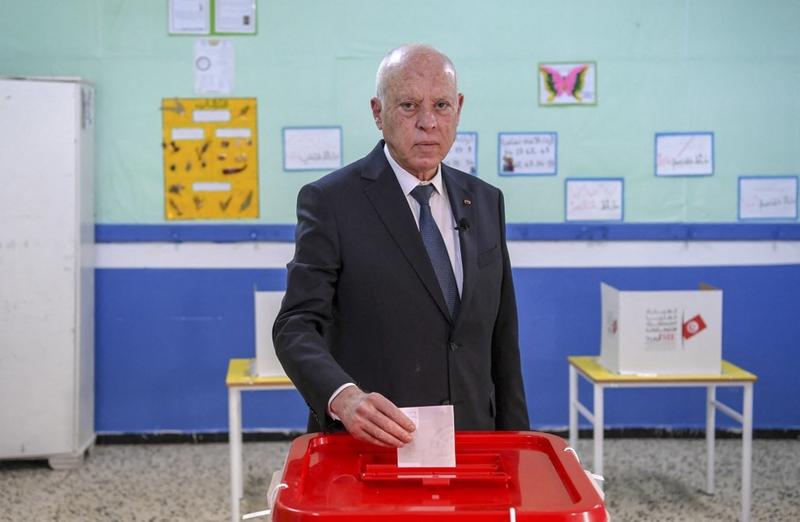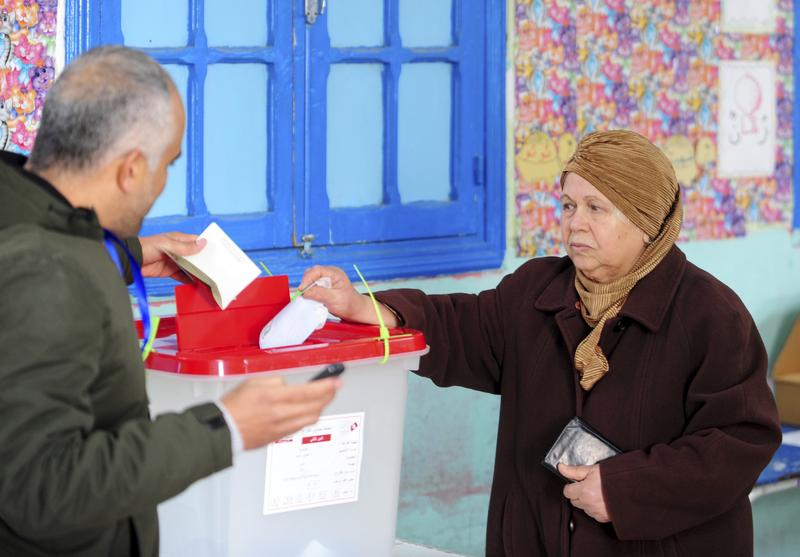 A handout picture provided by the press service of Tunisian presidency shows President Kais Saied casting his ballot at a polling station in the Ennasr district near Tunis on Dec 17, 2022, during the parliamentary election. (TUNISIAN PRESIDENCY PRESS SERVICE / HO / AFP)
A handout picture provided by the press service of Tunisian presidency shows President Kais Saied casting his ballot at a polling station in the Ennasr district near Tunis on Dec 17, 2022, during the parliamentary election. (TUNISIAN PRESIDENCY PRESS SERVICE / HO / AFP)
TUNIS - Tunisia's president on Monday blamed ultra-low turnout for parliamentary elections on hatred among voters of the parliament, not to a decline in his own popularity.
The electoral commission announced that only 11.4 percent of the electorate had voted on Sunday in parliamentary runoffs. Critics of President Kais Saied said the empty polling stations were evidence of public disdain for his agenda and seizure of powers.
Opposition parties called Saied to resign after what they called a "huge failure", saying early parliamentary and presidential elections were the only route out of the crisis.
ALSO READ: Tunisia sees 11.3% election turnout
Saied rejected accusations, calling his critics "traitors".
Many Tunisians appeared initially to welcome Saied's seizure of powers two years ago, after years of weak governing coalitions seemed unable to revive a moribund economy, improve public services or reduce stark inequalities
"90 percent did not vote. ... This confirms that Tunisians no longer trust this institution. ... During the past decade, Parliament has been an institution of absurdity and a state within the state", Saied said.
"Our popularity is greater than theirs", he added during a meeting with prime minister Najla Bouden.
Saied closed parliament with tanks in 2021, dismissed the government and started ruling by decree, a move the opposition called a coup.
He accused lawmakers of accepting huge sums of money in return for passing laws.
READ MORE: Polls open in Tunisian election with turnout under scrutiny
The newly configured parliament has had its role shrunk as part of a political system Saied introduced last year.
Many Tunisians appeared initially to welcome Saied's seizure of powers two years ago, after years of weak governing coalitions seemed unable to revive a moribund economy, improve public services or reduce stark inequalities.
 A Tunisian votes in the second round of the legislative elections in Tunis, Jan 29, 2023. (PHOTO / AP)
A Tunisian votes in the second round of the legislative elections in Tunis, Jan 29, 2023. (PHOTO / AP)
But Saied has voiced no clear economic agenda except to rail against corruption and unnamed speculators, whom he has blamed for rising prices.
ALSO READ: New Tunisia constitution passed in vote with low turnout
Unlike the previous parliament, the new one elected on Sunday will have limited powers. The formation and dismissal of governments will be in the hands of the president.
Over the past decade, parliament has been powerful and has appointed and dismissed governments. Despite the political tensions that took place in the previous parliament since the revolution, it had the ability even to dismiss the president and hold all officials accountable.


